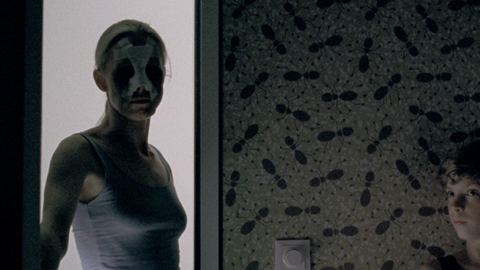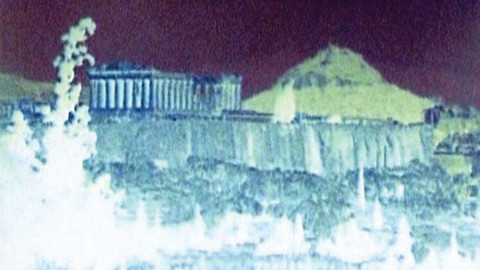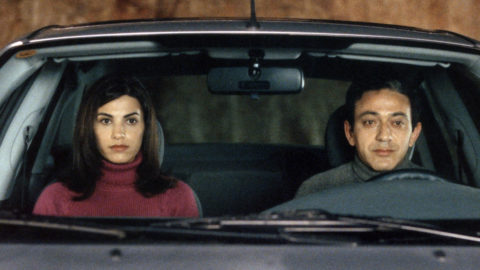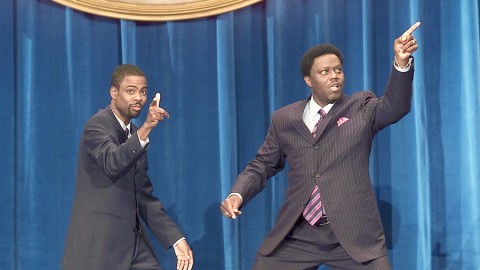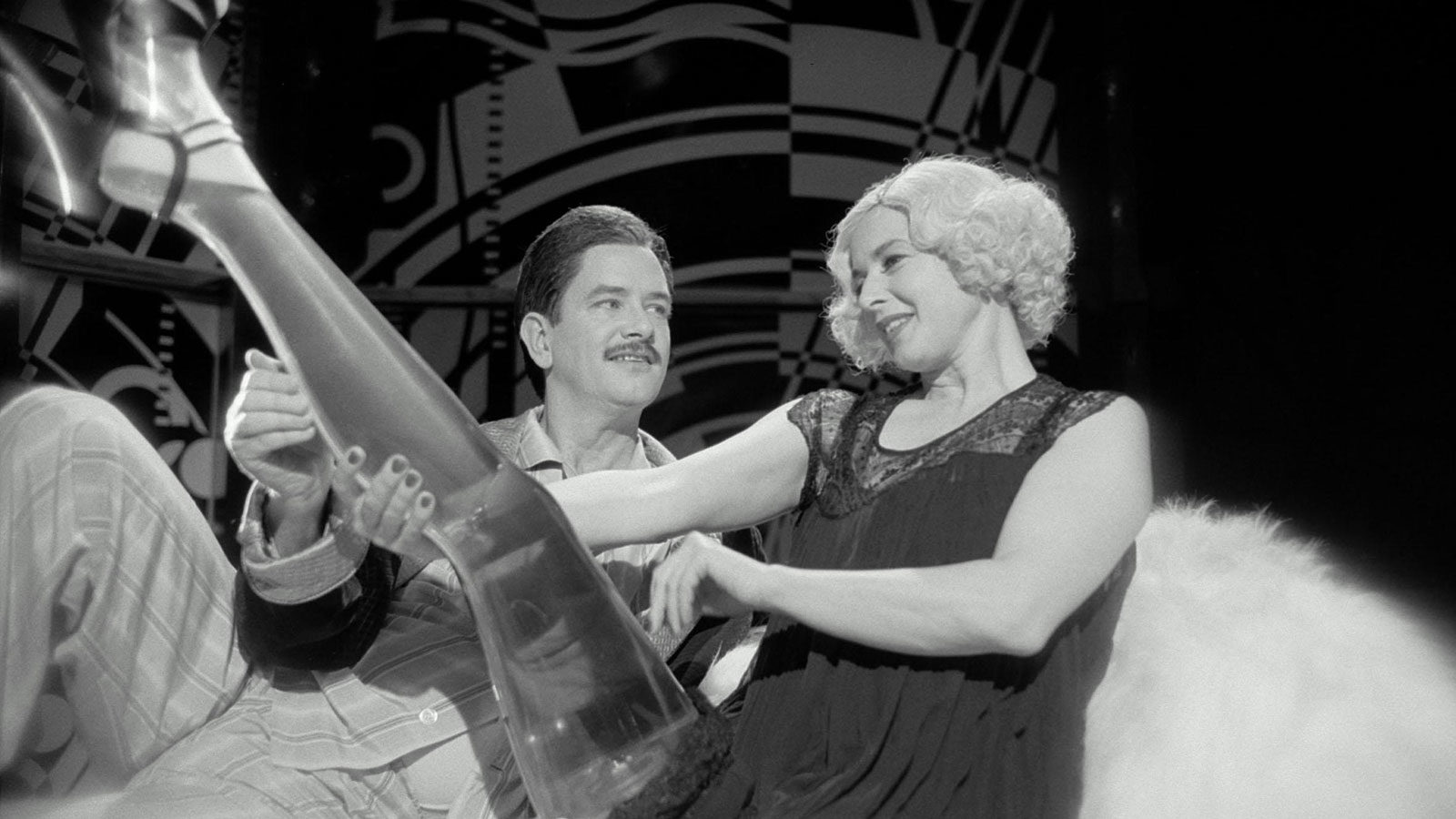
A Specter Called Knowledge
Aside from the ludicrous awards ceremony, Venice 2003 was fairly satisfying. In the festival’s four sections, there were half a dozen masterpieces: two by familiar auteurs (Marco Bellocchio and Tsai Ming-liang), three from filmmakers relatively unknown in the U.S. (Italy’s Paolo Benvenuti, India’s Goutam Ghose, and Japan’s Hiroki Ryuichi), plus a film co-directed by Jørgen Leth and Lars von Trier. More on these later. There was a decent fistful of rogue offerings: Bruno Dumont’s 29 Palms (pretentious, vacant, but endearingly deranged), Amos Gitai’s Alila (if you can imagine this Israeli director’s idea of a comedy, you’ll have some idea), Manoel de Oliveira’s A Talking Picture (a politically highly suspect but heartfelt vision of the death of Western Civilization at the hands of Islam), Michael Winterbottom’s Code 46 (icy visual poetry surrounds a troubled couple inhabiting the near future—the festival’s most underrated film), Daniele Cipr and Franco Maresco’s Il Ritorno di Cagliostro (an homage to unmade films no one wants to see), Kumakiri Kazuyoshi’s Antenna (therapeutic S & M and incest), Pen-ek Ratanaruang’s Last Life in the Universe (in-between days of wonder, plus a Takashi Miike cameo), Guy Maddin’s The Saddest Music in the World (Isabella Rossellini with beer-filled legs of glass), Manish Jha’s A Country Without Women (a bizarre, disturbingly violent satire on India’s caste system), and Royston Tan’s 15 (a pissed-off harsh neon-realist portrait of Singapore’s dark underbelly). All of this cushioned by a soft blanket of friendly art-house exercises and one fine, old-fashioned mainstream effort, Khyentse Norbu’s Travellers and Magicians.
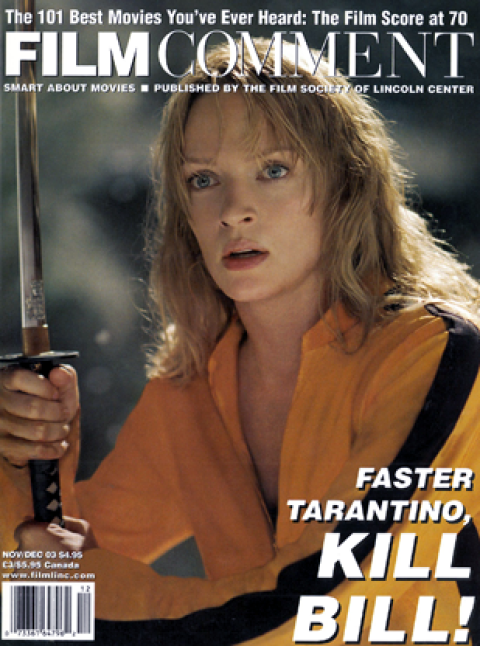
The festival’s bad rap was due to the much-anticipated, high-profile items (Allen, Bertolucci, Coen, González Iñárritu, Jarmusch, Scott) not delivering—and, on top of that, the inexcusable awards. The composition of the main juries promised disaster: they were bound together solely by a willingness to compromise in favor of mediocrity, most likely with a political façade of polite generality that these days passes for humanism, most likely by an unknown director (for the discovery factor), most likely from somewhere off the beaten track and/or from a current political hot spot. And so it came to pass: everything powerful, complex, unique, disturbing, or daring was ignored in favor of the easily agreed upon and easily forgotten, films for efficient democrats rather than critical, thinking individuals. The Golden Lion went to The Return, a garden-variety Tarkovsky or Sokurov by first-time director Andrei Zvyagintsev, remarkable only as a breakthrough for the pushy Intercinema Art Agency, Russia’s current mover and shaker on the international market. The Grand Prix went to Randa Chahal Sabbag’s pseudo-poetic political parable about the Lebanese-Israeli conflict, Le Cerf-volant, which pandered to the art-house crowd with embarrassing obviousness—it also suffered from dramaturgical problems and abysmal pacing. And Kurdish director Hiner Saleem’s Vodka Lemon, another strained exercise in picture-postcard aesthetics and political glibness, this time from a nonexistent country, won the San Marco prize. Add to this list the Best Actress award going to Katja Riemann in Margarethe von Trotta’s total sellout Rosenstrasse (the von Trotta whose The German Sisters won Venice in 1981 would have spat in her face), and you have a quagmire of bad cinema that perfectly mirrors the way everyone avoids dealing with sociopolitical and cultural complexity. But as long as it sells, who cares—right?
The one thing a film seems forbidden to do—particularly when it comes to critics and buyers, i.e., cinema’s sacerdotes and Pharisees—is expect its audience to have any (fore)knowledge about its subject, or worse still, require that knowledge to be understood. Which is exactly what the festival’s finest offerings did, and another reason why people were divided about the various films’ relative merits. With Benvenuti’s Secret File and Bellocchio’s Good Morning, Night the ãknowledge divideä ran along national/cultural lines, splitting those with an understanding of Italian history from everyone else. With Tsai’s Goodbye Dragon Inn and Ghose’s In the Forest Again (Abar Aranye) those knowledgeable in film history had the advantage over everyone else. On the other hand, there was Peter Greenaway’s The Tulse Luper Suitcases: Antwerp, a special presentation of elements from his high-concept trilogy-multimedia Gesamtkunstwerk. Greenaway expects brilliant viewers and gets pissed off when they don’t appreciate the multilayered complexities of his work, which these days resembles a Bourgeois Culture edition of Trivial Pursuit. It’s all sound and fury, signifying a lot, but meaning nothing. And by the way, if you don’t like what he’s doing, you’re probably a fascist. (At least that’s what he alluded to while pontificating in Venice.)
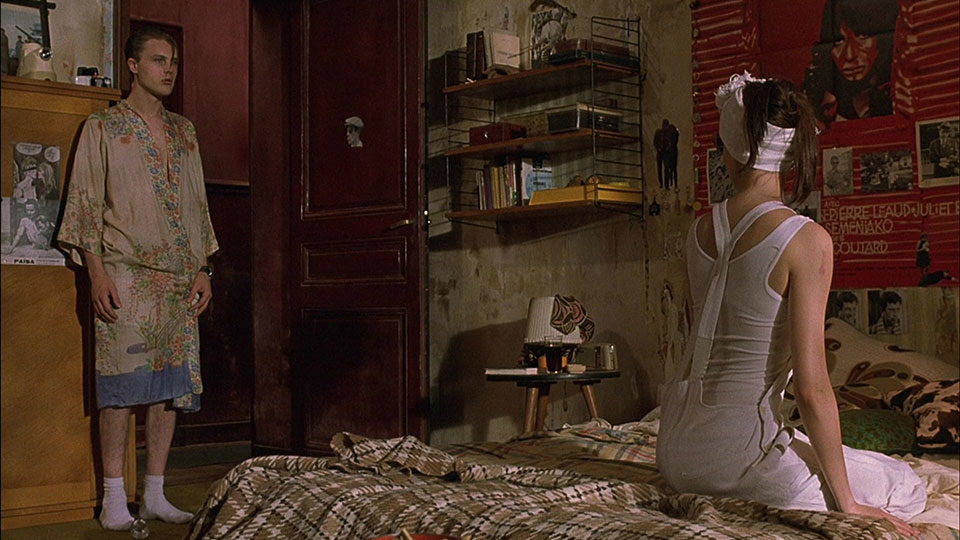
The Dreamers
That said, there’s one thing cinema seems to have given up asking of its viewers: trust. Trust that they won’t be abandoned, that the film will carry them and finally provide them with what they need. It’s depressing to see people reject films whose first minutes confound them with unfamiliar history, as happened at Cannes in 2001 with Ermanno Olmi’s awe-inspiring The Profession of Arms, which people fled in droves. For all our culture’s anti-intellectual bias, knowledge is still regarded as important—even if you don’t know what to do with it except give the right answers in a quiz show.
Which is roughly Bertolucci’s intellectual level in his dud, The Dreamers, a toothless Last Tango in Paris. The original was bourgeois sleaze posing as existential angst and featured fierce filmmaking full of piss and vinegar—pure braggadocio that helped it over its rough patches (don’t get me started on the Léaud scenes). His new film is a senile version of Tango: it involves an incestuous threesome screwing around in a Paris apartment in May ’68, while outside the French Cinemathèque gets shut down and students and workers take to the streets in protest. Forget about brash, this is as bland as it gets—each visual idea as labored and leaden as the one before. Moreover, Bertolucci reduces cinephilia to characters gasping at Shock Corridor, Breathless, and Mouchette—nice, safe choices that won’t disturb the art-house crowd with a glimpse of (gasp!) something weird, unknown, underrated, or forgotten. The point he misses is that cinephilia is a love of cinema itself, not obscurantism, but a love of art transcending canons and common knowledge, in which Black Sunday stands alongside Beautiful Sunday. The Dreamers serves up cinemania for those who no longer go to the cinema, sexual obsession for people who don’t have sex, and politics for those who no longer care but like to pay ideological lip service.
Much unlike Ryuichi’s Vibrator, my personal favorite of the festival, which proves that cinema can still express some of the peculiarities of the human heart—and lower body, for that matter. The film tells the story of a woman in her early thirties who gets the hots for a truck driver, jumps into his vehicle, and rides around with him. They talk, they fuck, they gaze silently out the window at the underbelly of industrial Japan; they listen to music, they remember, they change. We’re privileged to know, via intertitles, her often contradictory thoughts—whatever he thinks we can only guess. The film vibrates from all that’s possible. That’s a rare thing, especially with the kind of ease and humility with which Hiroki listens to his characters’ every single e/motion.
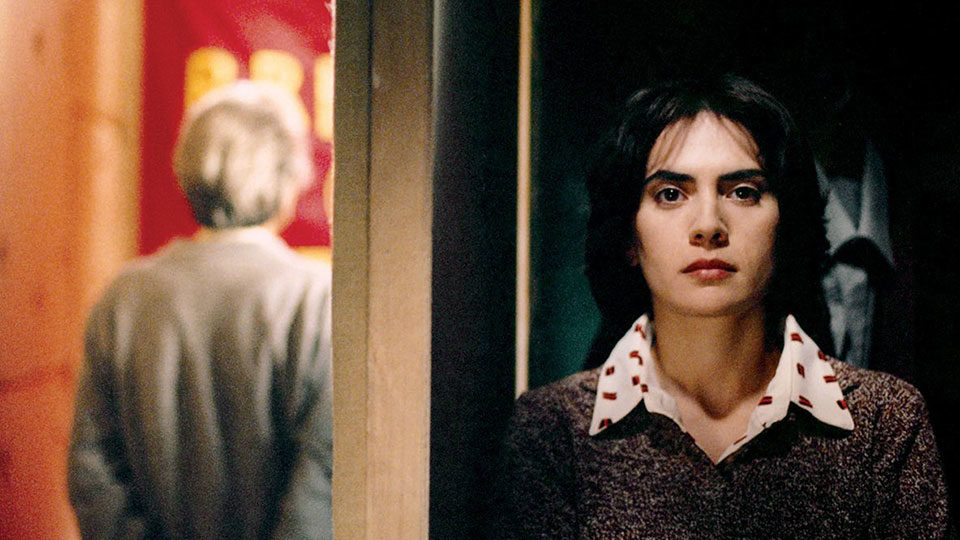
Good Morning, Night
To return to the question of knowledge, and with regard to Secret File, the festival’s scandal film, it certainly helps to know the historical background of the Portella della Ginestra Mayday massacre of 1947 and the ensuing trial of Salvatore Giuliano’s gang in 1951. The film reopens the case through the actions of a skeptical gang lawyer who becomes a clandestine prosecutor of, not for, the state, re-examining evidence in the light of recently declassified files. Benvenuti builds his case, shedding new light with a high-modernist approach à la Straub and Rossellini. He constructs his thesis about the true culprits and their motives in a series of exquisite tableaux, using an historian-lawyer-prosecutor’s tools and methods. Flashbacks occur as comic-book drawings, and at several points our revisionist lawyer walks around a scale model of the crime scene, demonstrating by the position of the sun at the time in question how certain events came about in 1947. Something that makes no sense in one light becomes comprehensible in another, and, by discounting chance, the truth reveals itself. Benvenuti is interested in the deeper truths behind the case, how a trial reveals the interconnection of church, state, and organized crime—i.e., Italy’s black unio mystica. In the penultimate scene, the whole cabal is put together in a kind of tarot card reading, which is swept away by a sudden gust of wind just before the final card (bearing Berlusconi’s face perhaps?) is placed—now, this is a film with guts. (Postscript: Two weeks after the highly successful Italian release of Secret File, Fandango, its production company, withdrew it from distribution. When the film received its international premiere at the Filmclub 813 in Cologne in September, the company ãforgotä to send the English-subtitled print. Fandango, by the way, is owned by Medusa, Prime Minister Silvio Berlusconi’s company.)
Another film with guts was Bellocchio’s Good Morning, Night, a Dostoyevskian reverse angle on his 1996 Kleist adaptation, The Prince of Homburg. The film daringly uses the Red Brigade’s 1978 kidnapping and execution of Christian Democratic leader Aldo Moro as the basis for an angry meditation on a son’s desperate need to kill his father—who, in turn, calmly accepts his fate, understanding that the child simply wants to be like him but can’t because too much time has passed. Through the looking-glass of his personality, the director reflects on Italy’s recent past, in which drama turns into tragedy and comes to represent Italy’s historical fate. Good Morning, Night should have won the Golden Lion—the Honorable Mention for Bellocchio’s direction felt like an insult. (The Silver Lion for Best Director went to Takeshi Kitano for his fine, superbly ironic swordplay film, Zatoichi).
Ghose’s In the Forest Again, Leth and Trier’s The Five Obstructions, and Tsai’s Goodbye Dragon Inn each take their cues from a classic. In Tsai’s ode to all that’s fleeting, King Hu’s 1967 masterpiece Dragon Inn plays in an old movie theater in which gay patrons cruise, a crippled woman yearns for love, and two elderly actors gaze at their younger onscreen selves and wonder where the light has gone. The film is like a spiritual membrane through which every emotion passes. In the Forest Again is both a sequel and remake of Satyajit Ray’s paradigmatic 1969 film Days and Nights in the Forest, moments of which repeatedly pop up like flares. The same characters played by the same actors once again go on a forest outing, accompanied by their now extended families, only to discover that they still can’t escape their bourgeois malaise, and that everything is worse. Their class, culture, and values are besieged by vulgarity and globalization, and all they can do is accept their doom (which makes the film a more measured version of Oliveira’s rant). Leth’s 1967 short The Perfect Human has become an ur-form or koan from which the Danish director has worked on several occasions, most notably with the magisterial, enigmatically titled Good and Evil (75). The Five Obstructions is the latest step in its development. Leth’s collaboration with Trier consists of five variations on the original short made according to rules devised by Trier. In formal terms, it refracts the original film and at the same time represents a five-step program of Trierian self-annihilation.
Isn’t it a little disturbing that three brilliant directors of the same generation felt the need to revisit a masterpiece from their youth in the late Sixties, the last decisive moment in (film) history? And isn’t it alarming that these films were the ones probing most deeply into the human soul—as if it’s no longer possible to say anything meaningful about mankind without recourse to the cinematic past?



